OK, the title was a bit of hyperbole, but I have encountered an important investment puzzle which, when solved, would address the issue of whether stocks are cheap or expensive.
Why are margins so high?
At the heart of the question is this chart from BoA/ML (via FT Alphaville) showing that the ratio of US market cap to GDP is now highly elevated relative to its own history. Market cap to GDP can be thought of as a proxy for Price to Sales.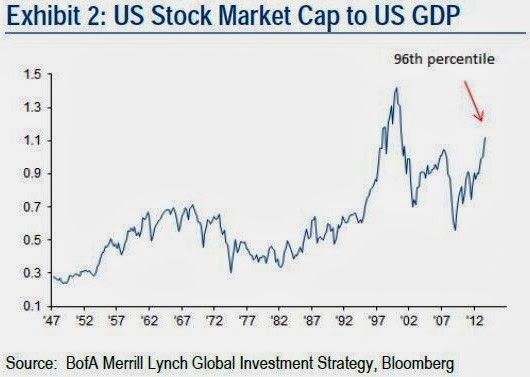
By extension, the P/E ratio is Price to Sales divided by net profit margins. So the question then becomes, why are profit margins so high?
On the one hand, you have the likes of John Hussman who believes that profit margins are likely to mean revert. His analysis of non-financial market cap to GDP and subsequent 10-year returns indicates that the potential for equity capital appreciation is limited.
Non-financial market cap to GDP and subsequent 10-year returns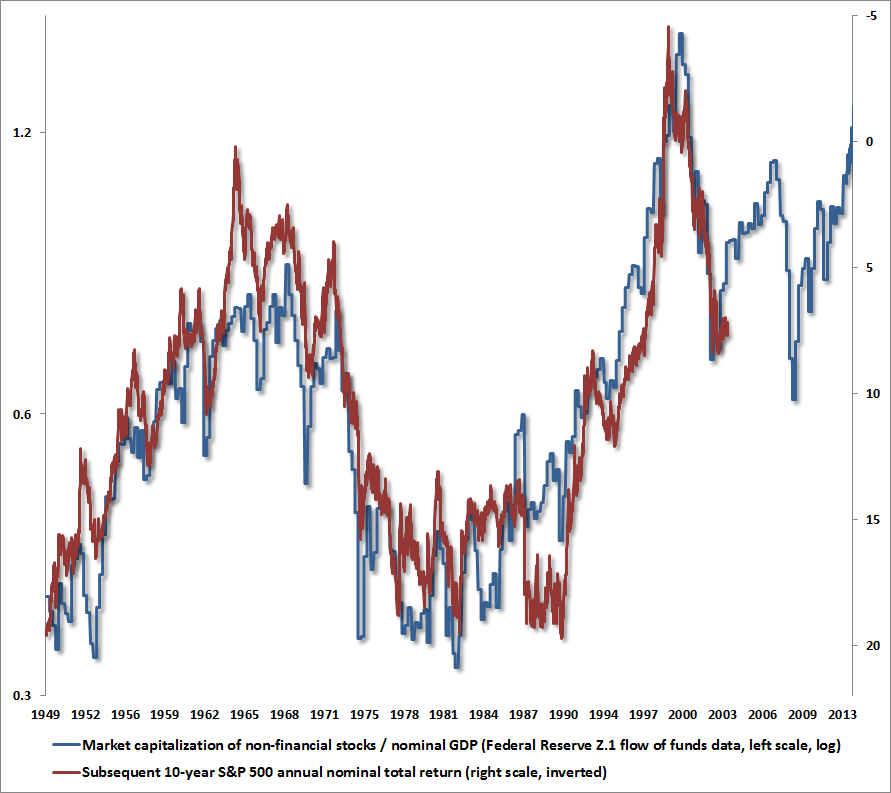
On the other hand, analysts like Dan Suzuki of BoA/ML (via Business Insider) wrote that the improvements in margins are the result of lower interest rates, lower tax rates, technology and energy costs. He believes that roughly two-thirds of the improvements in net margins, namely lower rates and taxes, are sustainable.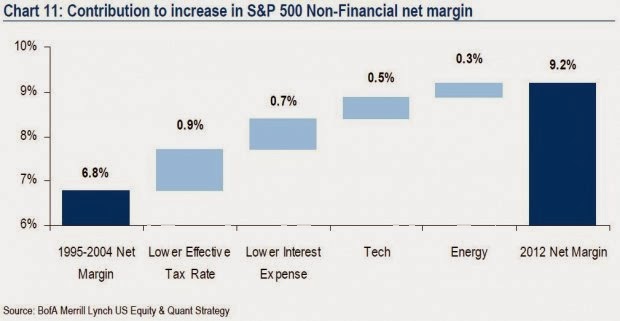
I have also seen Street analysis (that I can't find) which indicates that US multi-national margins are much higher than companies focused on the domestic economy. This effect is likely due to the tax avoidance schemes of multi-nationals whereby they shelter much of their income in offshore subsidiaries.
The investment puzzle
These arguments about whether net margins are elevated amount to a top-down macro analysis (they are elevated and therefore should mean revert) vs. a bottom-up micro analysis (it`s a regime change because interest rates are low and companies have learned to lower their effective tax rates). A better way of phrasing the real top-down economic puzzle was raised by Ben Inker of GMO, namely that if margins are so high and returns so attractive, then why has corporate investment been so low?
Here is an excerpt of a Morningstar interview with Inker [emphasis added]:
Kinnel: In April, you wrote about how corporate profits have been very high for a long time, leading you to wonder why reversion to the mean hasn't hit yet. What's your current thinking on this?
Inker: The behavior of corporate profits in the U.S. for the last 10 or 15 years is weird. It doesn't follow a standard capitalist script. If you've got a situation where there is a very high return on capital, which there has been on average for the last 10 or 15 years, you would expect to get a lot of investments. If the return on investment is high, capitalists go out there and invest. [If] the return on investment is low, they don't.
Well, the return on investment has been high, and yet we have been investing really quite little. There was a burst associated with the Internet bubble, but since then investment has been somewhere between a little bit anemic and, today, downright depressing. That doesn't do anything for expectations of future growth, because productivity growth really does require investment and we're not getting much investment. So, it's hard to see how we're going to get productivity growth, but profits for companies are really less about productivity growth and more about the return on capital. And if you are not getting a lot of investment, then you don't get one of the avenues towards pushing profit margins back down. Normally, higher investment would happen and that would lead to higher competition and the erosion of profit margins. So, if we're looking for reversion in profit margins, which we are, it's sort of the longer-term more subtle issues about what does it mean to have high profits in the corporate sector that is not accompanied by high investment.
Antonio Fatas, Professor of European Studies and Professor of Economics at INSEAD, asked a similar question on his blog, why did investment decline? 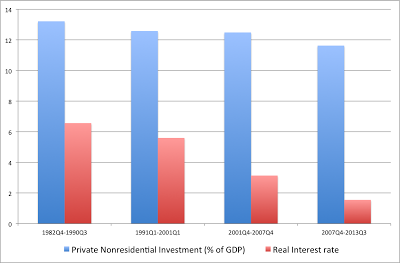
When we compare the last four expansions in the US economy we can see that while the real interest rate kept going down (especially in the 2001-2007 expansion), investment rates remained flat or even declined. I have included the current expansion in the chart although it is not comparable to the others as it has not finished yet.
What happened to investment? Why didn't it go up as real interest rates fell and the pool of savings was increasing? I am not sure we have an answer to these questions but what the data suggests is that we are not just facing the negative consequences of a deep recession, we should also have some concerns about the strength of the recovery based on the weakness of investment in the previous expansion (once we take into account the low level of interest rates).
In a separate post, Fatas pointed to a similar pattern of falling investments worldwide:
Below is a chart that I have constructed using data from the IMF (World Economic Outlook database). I have calculated the aggregate investment rate (as % of GDP) for all advanced economies using the GDP share of each of these countries as weights [using PPP adjusted weights makes no difference for these countries].
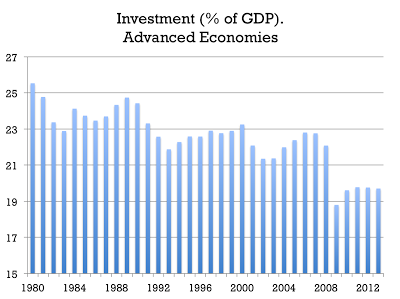
The Big Question
So here is the Big Question: If net margins are so high, what happened to the missing investment?
The analysis from Dan Suzuki of BoA/ML indicating that net margins are elevated screams "low cost of capital" to me. In past instances where we have seen low costs of capital (Japan in the 1980's and China today), we have seen an investment bubble form. When companies enjoy low cost of capital, the proper response is to raise as much money as you can and buy something, anything, to raise your returns. So if the cost of capital is so low, why haven't we seen a surge in corporate investments in the developed markets?
Something is not adding up here. The analyst who solves this puzzle will resolve the margin puzzle and therefore the question of whether stock prices are cheap or expensive.
Disclosure: Cam Hui is a portfolio manager at Qwest Investment Fund Management Ltd. (“Qwest”). The opinions and any recommendations expressed in the blog are those of the author and do not reflect the opinions and recommendations of Qwest. Qwest reviews Mr. Hui’s blog to ensure it is connected with Mr. Hui’s obligation to deal fairly, honestly and in good faith with the blog’s readers.”
None of the information or opinions expressed in this blog constitutes a solicitation for the purchase or sale of any security or other instrument. Nothing in this blog constitutes investment advice and any recommendations that may be contained herein have not been based upon a consideration of the investment objectives, financial situation or particular needs of any specific recipient. Any purchase or sale activity in any securities or other instrument should be based upon your own analysis and conclusions. Past performance is not indicative of future results. Either Qwest or I may hold or control long or short positions in the securities or instruments mentioned.
